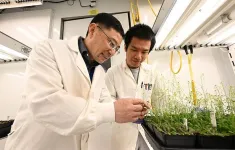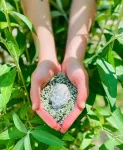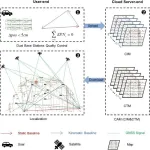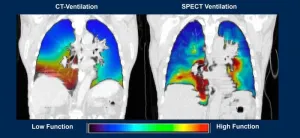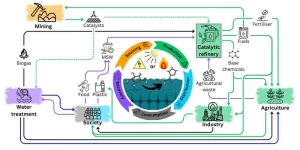(Press-News.org) Roughly one in five cancer patients benefits from immunotherapy – a treatment that harnesses the immune system to fight cancer. Such an approach to beating cancer has seen significant success in lung cancer and melanoma, among others. Optimistic about its potential, researchers are exploring strategies to improve immunotherapy for cancers that don’t respond well to the treatment, with the hope of benefiting more patients.
Now, researchers at Washington University School of Medicine in St. Louis have found, in mice, that a strain of gut bacteria – Ruminococcus gnavus – can enhance the effects of cancer immunotherapy. The study, which appears May 17 in Science Immunology, suggests a new strategy of using gut microbes to help unlock immunotherapy’s untapped cancer-fighting potential.
“The microbiome plays an important role in mobilizing the body’s immune system to attack cancer cells,” explained the study’s senior author, Marco Colonna, MD, the Robert Rock Belliveau, MD, Professor of Pathology. “Our findings shine a light on one bacterial species in the intestine that helps an immunotherapy drug eliminate tumors in mice. Identifying such microbial partners is an important step in developing probiotics to help improve the effectiveness of immunotherapy drugs and benefit more cancer patients.”
Cancer immunotherapy employs the body’s immune cells to target and destroy tumors. One such treatment uses immune checkpoint inhibitor drugs to unleash the immune system by releasing the natural brakes that keep immune T cells quiet, a feature that prevents the body from harming itself. But some tumors fight back to suppress the attacking immune cells, damping the effectiveness of such inhibitors.
Colonna and first co-author Martina Molgora, PhD, a postdoctoral researcher, previously established a collaboration with colleague Robert D. Schreiber, PhD, the Andrew M. and Jane M. Bursky Distinguished Professor, in which they completely eliminated sarcoma tumors in mice using a two-pronged inhibition approach. The researchers inhibited TREM2, a protein made by tumor macrophages to stop T cells from attacking the growing tumor. They then showed that a cancer immunotherapy drug was more effective when TREM2 was blocked. The result indicated that TREM2 dampens immunotherapy’s efficacy.
In an experiment that formed the basis of the new study, the researchers made a surprise observation. TREM2 mice had the same beneficial response to the checkpoint inhibitor when they were housed with mice lacking the protein. This result came about when the researchers deviated from their typical protocol of separating the mice before treating them with the inhibitor.
Cohabiting mice share microbes with one another. The researchers suspected the effects might have been due to exchanges of gut bacteria. The researchers worked with Jeffrey I. Gordon, MD, the Dr. Robert J. Glaser Distinguished University Professor, and co-first author Blanda Di Luccia, PhD, a postdoctoral researcher, to study the microbes in the intestines of the mice that were treated successfully with immunotherapy. They found an expansion of Ruminococcus gnavus, compared with a lack of such microbes in mice that didn’t respond to the therapy.
R. gnavus has been found in gut microbiota of cancer patients who respond well to immunotherapy, Colonna explained. In clinical trials, fecal transplants from such individuals have helped some unresponsive patients reap immunotherapy’s benefits.
The researchers, including co-first author and graduate student Darya Khantakova, introduced R. gnavus to the mice and then treated the tumors with a checkpoint inhibitor. The tumors shrank, even when TREM2 was available as a weapon to dampen the effect of the immunotherapy.
Gordon, director of the Edison Family Center for Genome Sciences & Systems Biology, noted that evidence is mounting that the microbiota boosts immunotherapy. Identifying relevant species, such as R. gnavus, could lead to a next-generation probiotic that could synergize with immunotherapy to improve cancer care, he explained.
The scientists next aim to understand how R. gnavus assists in tumor rejection, which may reveal new ways to help cancer patients. For example, if the microbe produces an immune-activating metabolite through the process of digesting food, that knowledge opens the opportunity to use metabolites as immunotherapy enhancers. Microbes also can leak out of the gut and trigger an immune response in the tumor or activate gut T cells that migrate to the tumor to mount an attack, Colonna explained. The researchers are exploring the three possibilities.
END
Gut bacteria boost immune response to fight tumors
Microbe enhances cancer immunotherapy in mouse study
2024-05-17
ELSE PRESS RELEASES FROM THIS DATE:
How heatwaves are affecting Arctic phytoplankton
2024-05-17
The basis of the marine food web in the Arctic, the phytoplankton, responds to heatwaves much differently than to constantly elevated temperatures. This has been found by the first targeted experiments on the topic, which were recently conducted at the Alfred Wegener Institute’s AWIPEV Station. The phytoplankton’s behaviour primarily depends on the cooling phases after or between heatwaves, as shown in a study just released in the journal Science Advances.
Heatwaves, which we’ve increasingly seen around the globe in recent years, are also becoming more and ...
NUS scientist Professor Lim Chwee Teck elected Fellow of the Royal Society
2024-05-17
Professor LIM Chwee Teck, Director of the Institute for Health Innovation & Technology at the National University of Singapore (NUS iHealthtech) and NUSS Professor, has been elected to the prestigious Fellowship of the Royal Society, in recognition of his invaluable contributions to science.
The Royal Society is the world's oldest and most esteemed scientific academy in continuous existence, as well as the United Kingdom’s national academy of sciences. Fellows are elected annually, and candidates are evaluated based on their exceptional achievements in science. This ...
Modern plant enzyme partners with surprisingly ancient protein
2024-05-17
UPTON, N.Y. — Scientists from the U.S. Department of Energy’s (DOE) Brookhaven National Laboratory have discovered that a protein responsible for the synthesis of a key plant material evolved much earlier than suspected. This new research explored the origin and evolution of the biochemical machinery that builds lignin, a structural component of plant cell walls with significant impacts on the clean energy industry.
When the first land plants emerged from aquatic environments, they needed to adapt in order to survive.
Chang-Jun Liu, a senior scientist in Brookhaven’s Biology ...
Ion irradiation offers promise for 2D material probing
2024-05-17
Two-dimensional materials such as graphene promise to form the basis of incredibly small and fast technologies, but this requires a detailed understanding of their electronic properties. New research demonstrates that fast electronic processes can be probed by irradiating the materials with ions first.
A collaboration involving researchers at the University of Illinois Urbana-Champaign and the University of Duisburg-Essen has shown that when graphene is irradiated with ions, or electrically charged atoms, the electrons that are ejected ...
Scientists develop new geochemical ‘fingerprint’ to trace contaminants in fertilizer
2024-05-17
DURHAM N.C. – An international team of scientists has uncovered toxic metals in mineral phosphate fertilizers worldwide by using a new tool to identify the spread and impact of such contaminants on soil, water resources, and food supply.
“While mineral phosphate fertilizers are critical to boost global sustainable agriculture and food security, we found high levels of toxic metals in many fertilizers worldwide,” said Avner Vengosh, chair of the Earth and Climate Sciences division at Duke University’s Nicholas School of the Environment. “Our study developed a new method to identify sources and impacts of these metals on the environment.” Those ...
From the road to the cloud: leveraging vehicle GNSS raw data for spatial high-resolution atmospheric mapping and user positioning
2024-05-17
Innovative Global Navigation Satellite System (GNSS) positioning technologies harness massive vehicle-generated data to create high-resolution atmospheric delay correction maps, significantly enhancing Global Positioning System (GPS) accuracy across varied spatial scales. This new method exploits real-time, crowd-sourced vehicle GNSS raw data, refining traditional GPS applications and presenting a cost-effective solution for precise positioning.
The quest for enhanced Global Navigation Satellite System (GNSS) accuracy has been hindered ...
Study suggests that air pollution promotes inflammation in the brain, accelerating cognitive decline and increasing risk of dementia
2024-05-17
Results from new study suggests that long-term exposure to air pollution leads to increased risk in dementia in Denmark.
"We also find association with noise, but this seems to be explained by air pollution primarily. Our study is in line with growing international knowledge on this topic." says Professor at Section of Environmental Health Zorana Jovanovic Andersen.
This is an important finding which adds that air pollution, beyond well-known effects on respiratory and cardiovascular system, also has major impacts on our brain, promoting inflammation in the brain, accelerating cognitive decline, and increasing ...
New imaging software improves lung diagnosis for 30% of patients who can't tolerate contrast dye; has added diagnostic benefits for all patients
2024-05-17
Southfield, Mich., May 17, 2024 – For up to 30% of patients who are allergic to medical contrast dye or have a dye restriction because of other health conditions, they might find that it takes longer to get a diagnosis when it comes to life-threatening lung issues such as pulmonary embolism. That's because imaging methods that detect lung problems but don't use contrast dye aren't as accurate and can be more time-consuming to administer.
Now, new imaging software, developed by pulmonologist Girish Nair, M.D., with Corewell Health William Beaumont University Hospital in Royal Oak, Michigan, and biomedical ...
A trial HIV vaccine triggered elusive and essential antibodies in humans
2024-05-17
DURHAM, N.C. – An HIV vaccine candidate developed at the Duke Human Vaccine Institute triggered low levels of an elusive type of broadly neutralizing HIV antibodies among a small group of people enrolled in a 2019 clinical trial.
The finding, reported May 17 in the journal Cell, not only provides proof that a vaccine can elicit these antibodies to fight diverse strains of HIV, but that it can also initiate the process within weeks, setting in motion an essential immune response.
The vaccine candidate targets an area on the HIV-1 outer envelope called the membrane proximal external region (MPER), which ...
Can we revolutionise the chemical industry and create a circular economy? Yes, with the help of catalysts
2024-05-17
The chemical industry is a cornerstone of global development, driving innovation, and providing essential products that support our modern way of life.
However, its reliance on unsustainable fossil resources has posed significant threats to global ecosystems through climate change and chemical pollution.
A new commentary published in Cell Press’ OneEarth co-authored by Griffith University researchers puts forth a transformative solution: catalysis to leverage sustainable waste resources, ushering the industry from a linear to a circular economy.
“If ...
LAST 30 PRESS RELEASES:
Family relationships identified in Stone Age graves on Gotland
Effectiveness of exercise to ease osteoarthritis symptoms likely minimal and transient
Cost of copper must rise double to meet basic copper needs
A gel for wounds that won’t heal
Iron, carbon, and the art of toxic cleanup
Organic soil amendments work together to help sandy soils hold water longer, study finds
Hidden carbon in mangrove soils may play a larger role in climate regulation than previously thought
Weight-loss wonder pills prompt scrutiny of key ingredient
Nonprofit leader Diane Dodge to receive 2026 Penn Nursing Renfield Foundation Award for Global Women’s Health
Maternal smoking during pregnancy may be linked to higher blood pressure in children, NIH study finds
New Lund model aims to shorten the path to life-saving cell and gene therapies
Researchers create ultra-stretchable, liquid-repellent materials via laser ablation
Combining AI with OCT shows potential for detecting lipid-rich plaques in coronary arteries
SeaCast revolutionizes Mediterranean Sea forecasting with AI-powered speed and accuracy
JMIR Publications’ JMIR Bioinformatics and Biotechnology invites submissions on Bridging Data, AI, and Innovation to Transform Health
Honey bees navigate more precisely than previously thought
Air pollution may directly contribute to Alzheimer’s disease
Study finds early imaging after pediatric UTIs may do more harm than good
UC San Diego Health joins national research for maternal-fetal care
New biomarker predicts chemotherapy response in triple-negative breast cancer
Treatment algorithms featured in Brain Trauma Foundation’s update of guidelines for care of patients with penetrating traumatic brain injury
Over 40% of musicians experience tinnitus; hearing loss and hyperacusis also significantly elevated
Artificial intelligence predicts colorectal cancer risk in ulcerative colitis patients
Mayo Clinic installs first magnetic nanoparticle hyperthermia system for cancer research in the US
Calibr-Skaggs and Kainomyx launch collaboration to pioneer novel malaria treatments
JAX-NYSCF Collaborative and GSK announce collaboration to advance translational models for neurodegenerative disease research
Classifying pediatric brain tumors by liquid biopsy using artificial intelligence
Insilico Medicine initiates AI driven collaboration with leading global cancer center to identify novel targets for gastroesophageal cancers
Immunotherapy plus chemotherapy before surgery shows promise for pancreatic cancer
A “smart fluid” you can reconfigure with temperature
[Press-News.org] Gut bacteria boost immune response to fight tumorsMicrobe enhances cancer immunotherapy in mouse study


